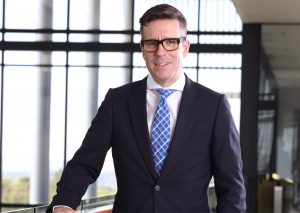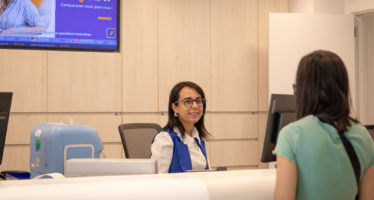Convergence Partners CEO Brandon Doyle: Converging on Strategy and Social Needs

Brandon Doyle
Investors naturally want to be associated with a success story that has a purpose, and positive progress. Convergence Partners gives them a chance to do so.
Over the past 15 years, the company has been a seasoned player in pan-African private equity. Convergence Partners seeks impact investing opportunities to fuel communications and ICT infrastructure across the continent – while generating above market investor returns. Convergence Partners’ portfolio reflects its commitment to communications access, broadband services and tech offerings in Africa. Its track record reflects the team’s capacity to add value across the investment lifecycle.
Brandon Doyle was one of Convergence’s founding partners and has been running the business since its inception. He has spent half of an almost 30-year career striving to fulfil the firm’s impact investing aspirations. Before Convergence, he held leadership roles at Nedbank, FBC Fidelity and Anglo American.
“I was an investment banker before I started getting involved in the private equity world,” he said, “and I got to a point where it felt like what I was personally doing, on a daily basis, had a lack of meaning and purpose.”
Brandon Doyle was doing well, by all accounts, generating profits for clients and company. But, amidst the endless shuffling of paperwork, he began to dream of getting involved in something that would make a meaningful difference.
“It was that point of realisation that set me down a different path,” he said. “With the skills and capabilities that I have, could I not be doing something that is a great deal more satisfying?”
Brandon Doyle shared the desire to create a purpose-driven, future-focused organisation with the fellow founding partners of Convergence, Andile Ngcaba, Idan Segal and Stefan Ferreira. The leadership team benefits from a camaraderie formed years before the business came into being, as colleagues, partners and friends. Together, they have built an organisation that, at the micro level, has a family style and partnership orientation.
“I think that’s carried forward to the structure and the culture of the organisation,” says Brandon Doyle. “Anyone walking through our doors will immediately be struck by a number of things. It’s a very, very flat structure, and a culture where everybody is welcomed. And when it comes to decision-making, there’s a lot of democratisation.”
The leadership act as libraries of excellence and instruction, while the democratic management model encourages initiative and accountability from each team member. Convergence Partners has assembled a diverse, inclusive and multicultural team with a balance of age, gender, background, race and origin.
As a business focusing on the broader technology sector, there are rapid changes that the team must stay abreast of. “Young professionals in their early 20s bring a lot to the table. They have a real life understanding of these technologies and how they work and what the good and the bad is. And so, for us, age diversity is actually quite a critical factor.”
Convergence Partners goes beyond the typical private equity fund model to get involved in early-stage projects and to engage with investee companies via active participation beyond just board activities. “There’s a lot of work we do that is much more than just investing in promising businesses,” Doyle says. “It’s actually making businesses happen.”
Convergence Partners has invested to build networks, launch satellites and repurpose infrastructure of telecom operators across Africa to ensure it’s well-positioned to capitalise on the changing market landscape. The emergence of the mobile wave in Africa has proven the investment thesis that there is both a commercial market for ICT in Africa, along with a positive impact orientation and acted as a catalyst for independent network development.
“The world is changing and we’re turning to digital communication,” notes Doyle. “Networks, particularly in a continent like Africa, are going to be the delivery mechanism for almost all services and occasions, whether it’s education, health care, security, trade or banking.
“If the hypothesis holds and data is going to be what needs to be traversed over communications networks, then you can’t have a situation with these backbone networks owned by a single, monopolistic incumbent or which were built to only serve a voice market.”
Convergence Partners takes a wholesale open-access approach to gain market share through investee ownership stakes and to create economies of scale anchored in accessible price points, far-reaching coverage and quality services.
“Price points are rapidly coming down. Availability and coverage are rapidly increasing as is the quality of networks. This is massively vested in, and that’s created this enabling mechanism for a number of new players to come along and rely on the underlying telecoms networks and trusted business networks to deliver a raft of new fintech players,” Doyle said. “They’re often tech players and solutions and services that are really making a difference. But without that underlying enablement, they couldn’t exist and couldn’t do what they need to do for the people that really need it.”
He points to the digital divide as a key — and massively understated — challenge. Instead of the conventional meaning, which is mostly a measure of physical access to the telecoms networks, Doyle widens the lens to consider other factors that often come into play, like education levels, affordability or access to power to recharge mobile devices.
“What are the emerging business models and technologies that could deliver that?” he queried. “We’re very excited now about what’s happening in the global domain.”
The company is partnering with big players — Google, among others — to bring commodities to market using its infrastructure. Convergence Partners is deconstructing market challenges to develop cutting-edge solutions. It’s excited by the potential combination of emerging technologies in cloud computing, 5G networks, the Internet of Things, AI and blockchain security.
Convergence Partners’ first fund raised $85m and the second closed at near $200m. Its third fund aims to raise a total of $250m. Capital is deployed in a strict multistakeholder approach to target meaningful outcomes for all.
“I think a lot of impact investing up until quite recently has been papering over and just putting a little bit of tinsel on things,” he said, but there’s a sense that investors are starting to demand more of the businesses that they back, more than a healthy return on investment. “Because across multiple facets, it’s not just social impact issues, but also the environment, climate change and the development of good corporate citizenship policies and procedures.”
There’s a lot of momentum pushing corporate behaviour towards more responsible, sustainable and integrated activity. But Doyle believes that some corporations are still putting too much emphasis on certain financial dynamics, which is skewing the content and tone of public reporting and driving the wrong management behaviours.
“So they’re still on the road to travel here, but at least directionally, things seem to be moving slowly in a positive way,” Doyle commented. “I don’t think it translates into any meaningful change in behaviour just yet, but the mindfulness is starting to creep into the dialogue. And, of course, this is a good thing.”
You may have an interest in also reading…
BIAT: Strengthening Market Leadership Through Innovation, Digitalisation, and Responsible Governance
BIAT continues to assert its dominance in the Tunisian financial market, reinforcing its resilience with positive results. These achievements reflect
Over Half a Century of Service and Specialisation — the Years and the Successes Tell the Tale
The Qatar Insurance Company stands alone as a regional and international leader in its field. QIC, the first domestic insurance
Locked and Loaded in the Battle for Sustainability, Neuflize OBC Maintains Its Priority Values
Three-and-a-half centuries ago, France’s Banque Neuflize OBC was founded by entrepreneurs and philanthropists — and social responsibility has been a

















































































